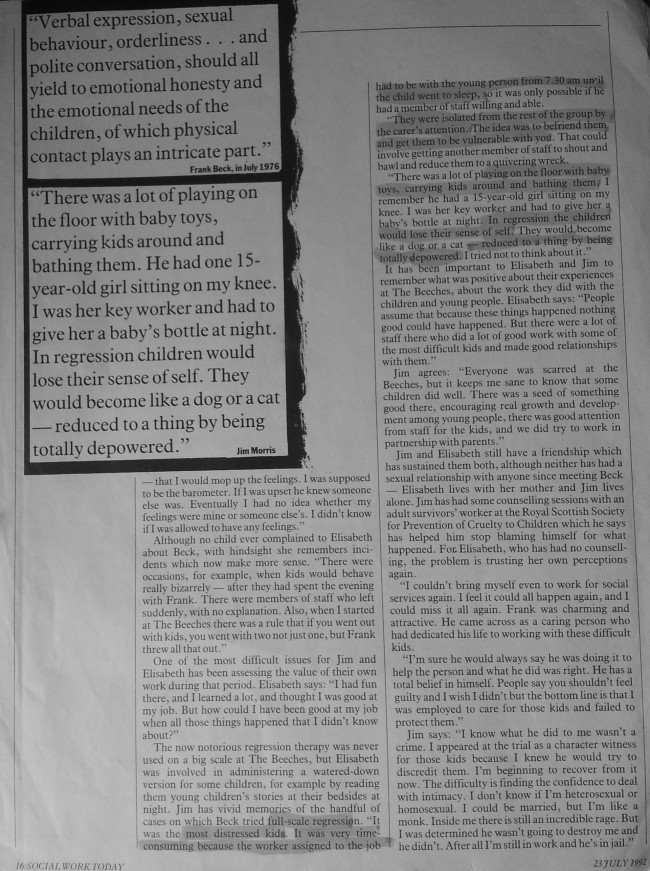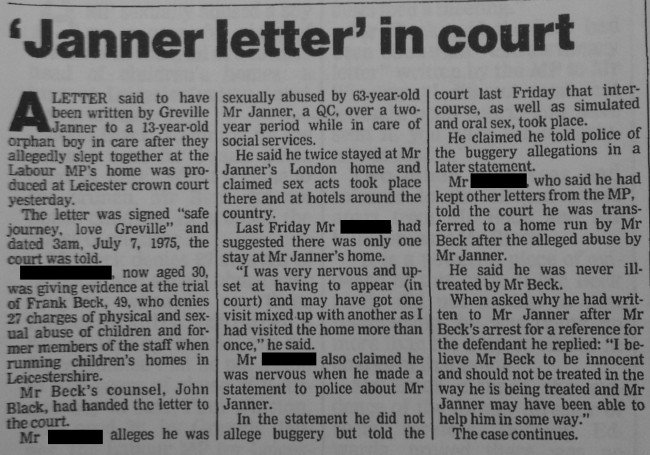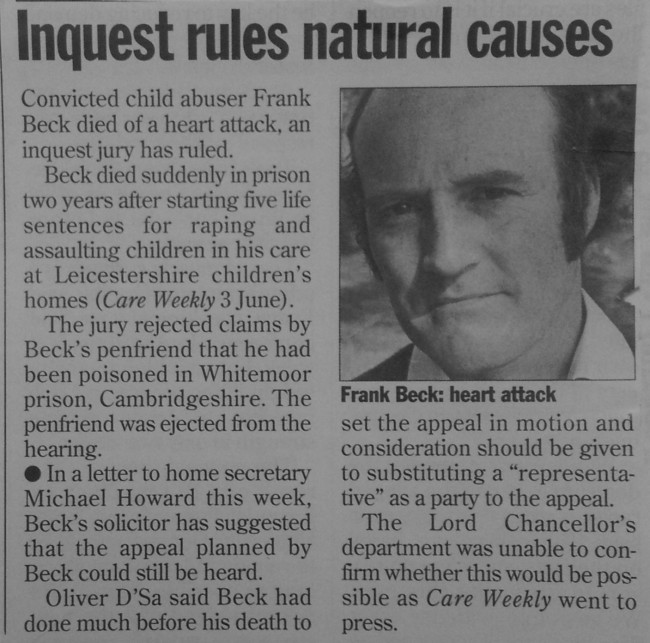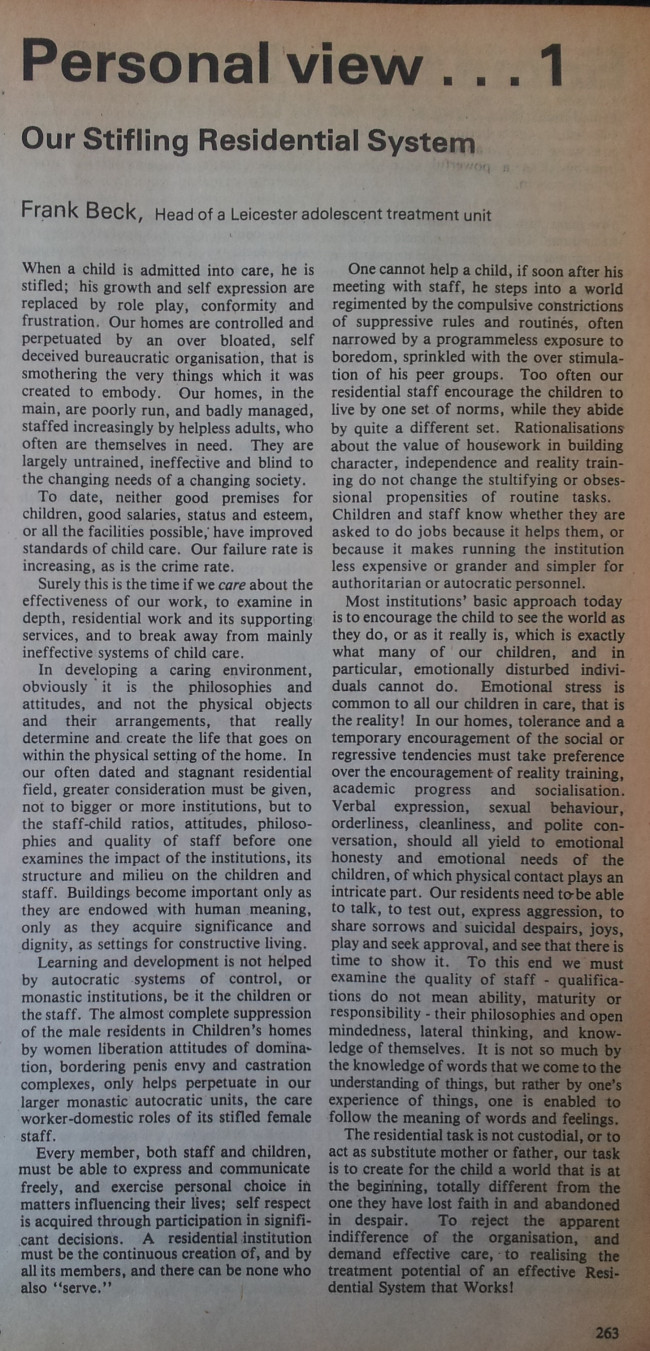Lord Janner: When Frank Beck worked for MI6 and children were bathed like dogs

Daily Mirror, 3rd December 1991
Lord Janner is still in the news. The Labour peer, who won’t face the court for alleged child abuse because his dementia makes him unfit for trial, remains in the media’s crosshairs…
Today’s news round-up:
The Daily Mail: “Home Office chiefs ignored FOURTH warning on Janner: Officials were told of child sex claims in 1995 report”
This goes to the top. Who warned them? What did they warn about?
The Home Office was warned that Lord Janner was abusing young boys two decades ago but did nothing about it.
What should it have done? Surely the Home Office can only act if there is evidence…
An MP passed a dossier of information to the department in the hope it would kick-start a fresh police investigation. But instead the paperwork was shelved by officials until it was discovered in 2013 and belatedly passed to Leicestershire Police.
Which officials? Why didn’t the MP make copies and send them to the Press? As ever, we just get more questions in place of facts. It all stinks. But what’s making the smell?
Does the Mail know?
Now the Daily Mail can reveal a fourth opportunity was missed when an unnamed MP passed a dossier to the Home Office in 1995. The politician received a letter linking Janner to prolific paedophile Frank Beck, who died in jail the previous year.

Social Work Today, 23rd July 1992
You can read more on LibDem councillor Frank Beck here and here. Beck, of Braunstone, was a depraved man. He lied and lied. He denied all charges put to him in court. In 1991, as Beck sat in court, he wept. The Press Association reported:
A former children’s homes chief broke down in court today as he told how he wrote to Labour MP Greville Janner in an attempt to stop his alleged relationship with an orphan boy in care.
Frank Beck, 49, wept as he told how he contacted the Leicester West MP at the House of Commons to try to end his contact with 15-year-old Mr A.
“The boy had been abused something chronic and I wasn’t going to have it,” Beck told Leicester Crown Court. Asked by John Black, defending, whether Mr A had ever tried to visit people outside the home, Beck said he had, adding: “I wrote to the person concerned in 1977 or 1978.” Mr Black asked him: “Who was it you wrote to, Mr Beck?”
Beck replied: “Greville Janner at the Commons in London.”
Mr Black asked: “Why did you write to him ?”
Beck, still weeping, said: “I had spent two years putting right the damage that man had done to that boy and he (Janner) had the bloody audacity to complain to me because the boy had been down to London and met him accidentally. I was incensed.”
Beck was a liar. That we know for certain. Lord Greville Janner of Braunstone addressed Beck’s allegations in the Commons. He denied all wrongdoing. You can read Janner’s statement here.

The Guardian, 12th November 1991
The Mail adds:
Beck was jailed in 1991 for abusing children after a trial in which Janner was named by a victim, prompting him to proclaim his innocence in the Commons. The MP expected the 11 pages of detailed notes, which also identified several other suspects, to be passed to police. But nothing was done until it was uncovered during a review of Home Office archives in 2013.
That victim was victim of Frank Beck. There were many. It’s fair to say that not all came forward.
Beck’s claims were widely reported. They were no secret.
A trawl through more than 700,000 documents identified four ‘items’ that should be passed to police. In a heavily censored report, one document involved the paedophile ring led by Beck which preyed on vulnerable children at Leicestershire care homes.
A ring? It’s not so organised as that. Beck was an opportunist, who took jobs that got him close to children. A culture of complacency and denial allowed him to thrive. Talk of a ring offers a way out for those who turned a blind eye to the abuse.

Care Weekly, 28th July 1994
In 1991, the Times reported:
The scale of Beck’s sexual and physical abuse of children and care staff did not become fully known until a chance remark by a former victim led to a police enquiry last year. However, Mr Newell’s report, compiled from contemporary records, suggests that a dossier of complaints, suspicions, police investigations and other concerns had begun to be amassed from the early Eighties.
Beck was hiding in plain sight:
1980: allegation of violence against girl, aged 15; Beck warned that incidents of malpractice should not be ”swept under the carpet”.
January 1982: staff at the Beeches, in Leicester, where Beck was in charge, complained about treatment of young people; Beck sought approval as foster parent.
June 1982: complaint to social worker that Beck had homosexual relationship with boy he planned to foster.
July 1982: report for foster approval indicated allegation of homosexuality but argued ”no need to pursue”; Beck charged with assault on boy in care, but received letters of support from staff; senior officers agreed not to suspend Beck pending court hearing.
August 1982: Beck warned of unacceptable methods after complaint of ill-treatment of child.
November 1982: social worker complained of violence and Beck’s relationship with prospective foster child.
February 1983: Beck found not guilty of assault at Leicester crown court.
May 1982: Beck approved as foster parent; three months later, another boy placed with him on lodging arrangement.
July 1983: another children’s home indicates that staff have heard stories of ill-treatment by Beck.
March 1984 to March 1986: more complaints, including claims of violence from former child in care. Two police enquiries found insufficient evidence to act.
All that and Frank Beck still became the head of three Leicestershire children’s homes.

Social Work Today, 24th October 1991
The Independent had more:
In 1986, two junior social workers, Bene Dawson, 33, and Steven Dawes, 25, wrote to Clifford Savage, deputy of the Beeches home, saying Beck had molested them.
Beck had done. And when adults talk, the officials listen.
Within a day of their letters reaching county hall, he resigned. But he was not dismissed, leaving on mutually acceptable terms. Brian Rice, Leicestershire’s then director of social services, wrote the reference, which Beck used to seek work with Reliance, a London-based social work agency. He then ran a children’s home in Brent, north-west London, for three months…
Mr Bibby, who is on a national police-social services committee on child abuse networks, said: ”It is typical of paedophiles to work for short periods in a children’s home to get a good reference and test out the managers to see if they pull them up for getting too close to kids. If the management is on the ball, they leave.”
Not a paedophile ring. That’s too simplistic. That’s lazy reporting. The story of Frank Beck is of a sick man in an ailing system. It is story of children being ignored by adults who should be helping them.
Beck followed a course of action familiar to those who study paedophiles. He married Alex Seale, his superior in Brent, who was responsible for monitoring his children’s home. They soon divorced. In the witness box Beck denied prosecution suggestions that the divorce was because she disliked his interest in her two sons. From there he moved to Hertfordshire, where he was working as a field social worker when he was arrested last year. The county has sacked him.
There will also be questions asked about other Leicestershire council officials charged with monitoring children’s homes. The 1986 complaint was not the first. John Cobb, then a principal assistant with the council and Beck’s immediate superior, said that he received ”between 9 and 12 complaints” from staff and children at the Beeches home, Leicester, which Beck ran from 1978. Mr Cobb, still a senior official in the county, said that all were properly investigated and referred to his superiors at county hall.
The police also missed the warning signals. Time and again, they returned to the homes children who had told them they had been abused. During the trial both prosecution and defence said that Beck was highly regarded in the social services department and treated locally as an authority on child care.
Complacency and denial permit criminals to carry on offending. It’s no peadophile ring.

Spotlight on Abuse: Peter Righton was a regular contributor to Social Work Today, the official publication of the British Association of Social Workers (BASW), and one article in particular – ‘Sex and the Residential Social Worker’ – reads like an appeal to other paedophiles working in residential care.
But Peter Righton wasn’t the only paedophile who wrote for Social Work Today. Frank Beck, the paedophile at the centre of the Leicestershire children’s homes scandal, was also given a platform for his views.
Social Work Today, 22nd July 1976
This site tells us more as it reviews The Leicestershire Inquiry 1992: by Andrew Kirkwood.
The conviction of Frank Beck on 29 November 1991 resulted in the establishment of two inquiries, one into the way in which the police had dealt with the allegations against Frank Beck and this one into all aspects of the management of children’s homes in Leicestershire County Council between 1973 and 1986. It was thus not concerned with the facts of the allegations but with the ways in which the social services department had come to employ the various people, including Frank Beck, against whom allegations had been made and how it had responded to those allegations. The trial also prompted the government to set up the Warner committee (Committee of Inquiry, 1992)…
And this is telling:
In Chapter 20 The appointment of Mr Beck and The ‘New’ Beeches 1978–1986, he recounts how Frank Beck applied for the Officer in Charge post at The Beeches while the investigation into Rosehill was still ongoing. [Frank Beck was appointed to offer 18½ hours to Rosehill following the departure of the Officer in Charge and sexually assaulted George Lincoln on his first evening.] The Director chaired the interviews and told Frank Beck that regression therapy was not appropriate for The Beeches. His appointment raised concerns among social workers because he had excluded them from Ratcliffe Road. There was a discussion about supervision for Frank Beck but it was left to him to ask for it which he never did.
Of the staff he inherited, the Deputy resigned, one stayed long-term, one became part-time and the remainder left within fourteen months; from 1978–1986 nearly 50 people were employed, mostly young, single and with no experience of residential child care.
In 1979–1980 Chris Beddoe attempted to evaluate his work but was stymied by Frank Beck’s inability to produce records of work. “Much of what Mr Beck did didn’t go through the normal conventional arrangements” (p. 132). Chris Beddoe left the department in 1980.
Instead Frank Beck provided a report which showed that The Beeches was deviating from its original purpose but this was allowed to drift; it was difficult to know which children were at The Beeches at any one time and regression therapy continued, with hitting, changing into pyjamas and staying in their room mentioned frequently in the log book.
Though there was psychiatric support, this consisted of support to the staff meeting rather than seeing children.
The story is of vulnerable children being ignored and a culture of denial that lets it go on for so long.
Tony Butler, the then Chief Constable of Gloucestershire and spokesman on abuse issues for chief police officers, said in 1991:
“In the past social workers and police officers simply didn’t believe the children. We didn’t think that short of thing went on in children’s homes. With Beck’s trial it became painfully clear that they could and did go on in children’s homes.”
But it never stopped. It continued in Rochdale, Rotherham, Oxford and on and on. And now? Where now?
The Times: “Abuse files on Janner destroyed ten years ago”
Can you review what is no longer there?
Special Branch files on the suspected child abuser Lord Janner are believed to have been destroyed more than a decade ago. Information about the Labour peer was gathered by police intelligence units during the 1960s, 1970s and 1980s when he was alleged to have been abusing boys, many of whom were in care homes run by local authorities in Leicestershire.
Alison Saunders, the director of public prosecutions, ruled this month that there was sufficient evidence to charge Lord Janner of Braunstone, 86, with 22 sex offences but that it was not in the public interest to do so because he was severely ill with dementia.
The DPP expressed “deep regret” that three clear opportunities had been missed by the police and the Crown Prosecution Service to take the former MP to court in 1991, 2002 and 2006.
Why was Janner targetted?
Sources told The Times that it was “common practice” for Special Branch units to gather material on politicians.
It was routine.
The ostensible purpose was to inform the vetting process if the politician was promoted to the Cabinet or to counter attempts by foreign spy agencies to compromise individuals.
And:
However, at some point the files were “weeded” to remove material and much uncorroborated material was destroyed. Some sources say this process happened when records were computerised but others claim it was done to protect the intelligence gatherers from accusations of spying on politicians.
Some say… Maybe… Any copies made?
Information from the files is unlikely to have been passed to Leicestershire police when they first investigated claims against Lord Janner in 1990-91…
A Met spokesman said last night that although Lord Janner had been publicly identified and the case against him laid out in detail by the DPP, its media policies prevented the force from discussing a named individual.
But innocence must be presumed.
Lord Janner’s family have issued a statement saying that he is “entirely innocent of any wrongdoing”.
Such are the facts…
Posted: 28th, April 2015 | In: Politicians, Reviews Comment | TrackBack | Permalink


